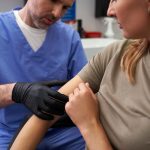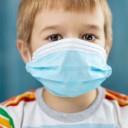-
Redefining Cancer Survivorship
As people with advanced disease live longer, they face physical and mental health side effects. Patient advocates say research and care must focus on their unique needs.
by Thomas Celona
-
Melanoma Risk in Childhood Cancer Survivors
People treated for childhood cancer found to have twice the risk of developing melanoma as an adult.
by Cameron Walker
-
Putting the Patient in the Driver’s Seat
In her new book, Cancer Support Community executive chair Kim Thiboldeaux offers advice to patients on how to steer their way through a cancer diagnosis, treatment and beyond.
by Kevin McLaughlin
-
Rethinking Access to Disability Benefits
Advances in screening and treatment mean there are more cancer survivors than ever, but survivors who struggle to work can face difficulty getting disability payments.
by Jen Tota McGivney
-
Should All Kids With Cancer Get Genetic Testing?
Testing children with cancer for hereditary mutations could impact their treatment and provide information relevant to other family members.
by Marcus A. Banks
-
Understanding How Radiation Causes Cancer
Researchers are investigating who is at greatest risk for radiation-induced cancers.
by Kate Yandell
-
How Long Do Immunotherapy Side Effects Last?
For people with melanoma who receive immune checkpoint inhibitors after surgery, side effects can remain even after treatment has been completed. These chronic side effects are most often mild.
by Anna Goshua
-
Chemobrain: It’s Not Your Imagination
Scientists discussed the mechanisms of chemotherapy-related cognitive impairment at a session dedicated to symptom science at the AACR Annual Meeting 2021.
by Marci A. Landsmann
-
Living Beyond a Diagnosis
Judy Pearson was surprised by the demands of cancer survivorship. Here, she offers tips on how to look at life after cancer.
by Judy Pearson
-
When Young Adults Need Care
For adolescents and young adults who have been diagnosed with cancer, caregivers can play an influential—but often overlooked—role in providing help and support.
by Carly Flumer
Cancer Talk
Celebrity Cancer Stories Can Lack Important Information
News coverage about public figures facing cancer frequently leaves out key details about the diagnosis and fails to provide background information on cancer.
by Laura Gesualdi Gilmore
AACR Annual Meeting 2025Immunotherapies, cancer vaccines and more from Cancer Today’s coverage of the AACR Annual Meeting 2025.
Redefining Cancer SurvivorshipAs people with advanced disease live longer, they face physical and mental health side effects. Patient advocates say research and care must focus on their unique needs.
by Thomas Celona
Family of Henrietta Lacks Works for ‘Health Intelligence’Alfred Lacks Carter Jr. and other family members honor the legacy of Henrietta Lacks by helping others better understand their health care.
by Kevin McLaughlin














